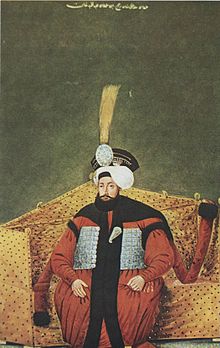Mustafa IV
| Mustafa IV مصطفى رابع |
|||||
|---|---|---|---|---|---|
| Caliph of Islam Amir al-Mu'minin Sultan of the Ottoman Empire Custodian of the Two Holy Mosques |
|||||
 |
|||||
| 29th Ottoman Sultan (Emperor) | |||||
| Reign | 29 May 1807 – 28 July 1808 | ||||
| Predecessor | Selim III | ||||
| Successor | Mahmud II | ||||
| Born | 8 September 1779 | ||||
| Died | 16 November 1808 (aged 29) | ||||
| Consorts | Şevkinur Kadın Seyyare Kadın Peykidil Kadın |
||||
| Issue | Şehzade Abdullah Emine Sultan |
||||
|
|||||
| Dynasty | House of Osman | ||||
| Father | Abdul Hamid I | ||||
| Mother | Ayşe Seniyeperver Sultan | ||||
| Tughra |  |
||||
| Full name | |
|---|---|
| Mustafa bin Abdul Hamid |
Mustafa IV (Ottoman Turkish: مصطفى رابع Muṣṭafā-yi rābi‘; 8 September 1779 – 16 November 1808) was the Sultan of the Ottoman Empire from 1807 to 1808.
Born in Constantinople, Mustafa IV was the child of Sultan Abdülhamid I (1774–1789) and Ayşe Seniyeperver Sultan.
Both he and his brother, Mahmud II, were the last remaining male members of the house of Osman I after their cousin, the reformist Sultan Selim III (1789–1807). They alone were therefore eligible to inherit the throne from Selim, by whom they were treated favorably. Since Mustafa was the elder, he took precedence over his brother to the throne. During his short reign, Mustafa would both save his cousin's life, and order him murdered. Mustafa was Sultan Selim III's favourite crown prince, but he deceived his cousin and co-operated with the rebels to take his throne.
Mustafa came to the throne in the wake of the turbulent events that led to the fatwa against Selim for "introduce[ing] among the Moslems the manners of infidels and show[ing] an intention to suppress the Janissaries." Selim fled to the palace, where he swore fealty to his cousin as the new sultan, and attempted to commit suicide. Mustafa spared his life by smashing the cup of poison that his cousin attempted to drink.
Mustafa's brief reign was turbulent. Immediately upon ascending to the throne, the Janissaries rioted throughout Constantinople, looting and murdering anyone who appeared to support Selim. More threatening, however, was a truce signed with the Russians, which freed Mustafa Bayrakdar, a pro-reformist commander stationed on the Danube to march his army back to Constantinople in an effort to restore Selim. With the aid of the Grand Vizier of Adrianople, the army marched on the capital and seized the palace.
...
Wikipedia
